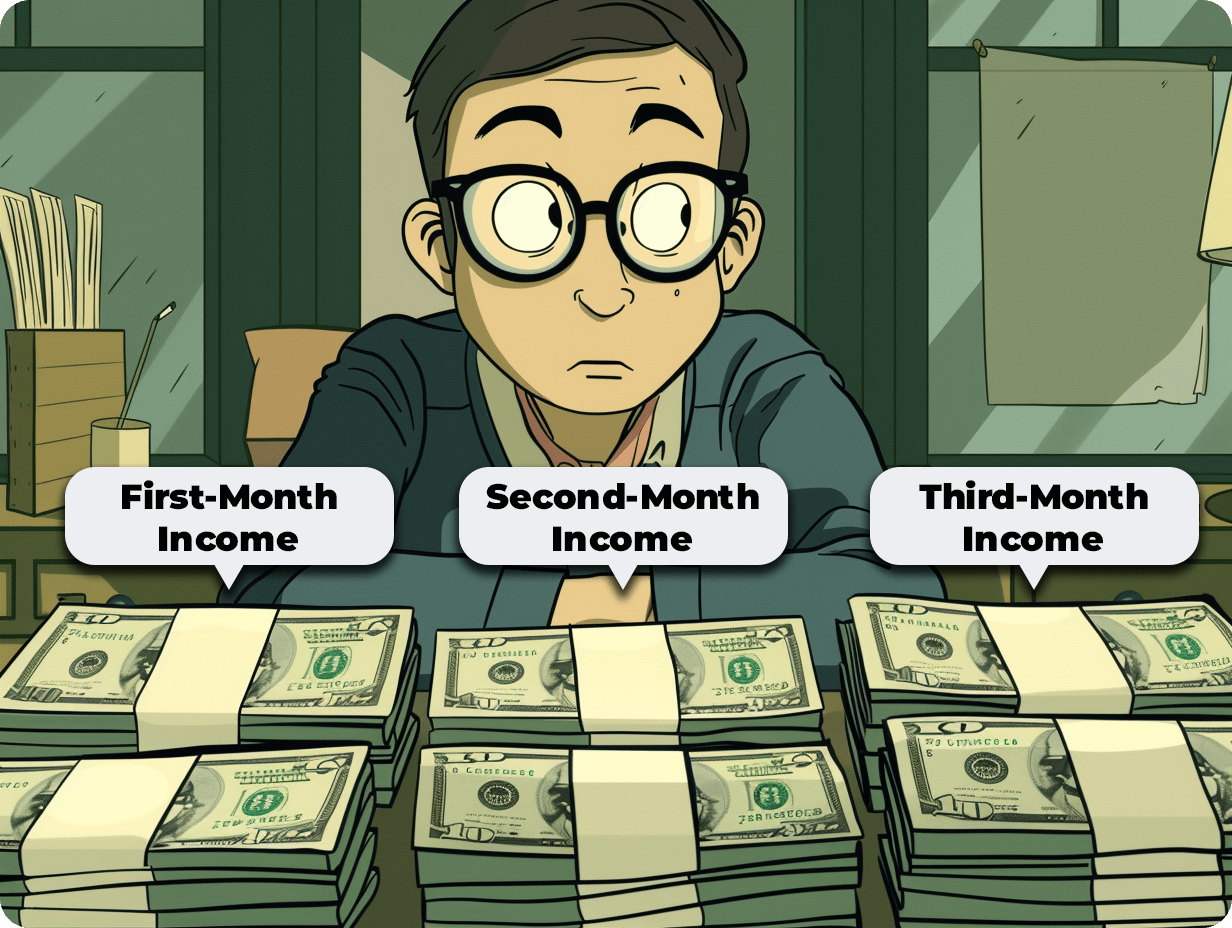- Blogs
- /
- How to Save Money on a Fixed Income: 5+ Effective Strategies
How to Save Money on a Fixed Income: 5+ Effective Strategies

Summary
Did you know that 72% of Americans live paycheck-to-paycheck? That means more than half of the population will experience financial difficulty if their paycheck is delayed by a week.
Living on a fixed income can be challenging, but saving money is a way out. However, how exactly can you save money when you barely have enough?
Well, living on a fixed income doesn’t mean you can’t save money. With some savvy strategies and smart choices, you can learn how to save money on a fixed income. Fortunately, we’ve covered everything from budgeting hacks to cutting costs without sacrificing quality.
These actionable steps will help you save money on a fixed income like a pro. You can use them to build an emergency fund or make the most of your hard-earned cash. Get ready to take control of your finances and watch your savings grow!
Key Takeaways
- Saving on a fixed budget is possible. You only have to employ innovative strategies and make good choices.
- Exploring part-time job opportunities can help to supplement fixed earnings. Consider renting out property, freelance work, gig economy platforms, and government assistance programs.
- Consider the pros and cons of each income source option before deciding.
- Explore investment options like stocks, mutual funds, and tax-advantaged retirement accounts.
- Consolidate debts for simplified payments and potential interest rate reductions.
- Understand Social Security benefits and seek professional advice for optimization.
- Open interest-bearing checking accounts and seek the best rates for savings and investments.
- Utilize CD ladders for higher interest rates and flexibility.
- Consider real estate investments for long-term financial well-being. Invest in education. Build credit history and save for retirement.
- Utilize budgeting apps or software to track spending and set financial goals.
- Review spending patterns and use automatic alerts for bill payments.
- Make informed financial decisions based on actual spending habits.
Understanding Fixed Income

A fixed income is a term used to describe a financial position in which a person or household depends on a steady revenue stream, frequently with slight fluctuation.
Examples of this income are pensions, Social Security benefits, annuities, or earnings from steady employment. Other ways to get fixed income include government assistance, pensions, work wages, and rental income from real estate.
Fixed income offers a consistent and dependable funding source, enabling people to successfully plan and budget without experiencing large swings in their income. People who get a fixed income may better manage their costs and financial commitments since they know how much money they will receive regularly.
However, although fixed income provides security, it may not have as much room for development as variable income sources like stock or company investments. And because fixed income puts stability and predictability ahead of the possible greater returns associated with riskier assets, it can be viewed as a conservative approach to financial management.
Those looking for financial security and stability must understand fixed income. People can negotiate economic uncertainty and make progress toward their financial goals by adequately managing fixed income and diversifying their income sources when feasible.
How to Save Money on a Fixed Income
A. Budgeting Techniques
1. Future-Oriented Plans
Saving money on a fixed income is crucial for financial stability. Even with limited funds, planning for the future can significantly impact your long-term financial well-being. Starting early to save for retirement allows you to benefit from compound interest. Your money grows over time. It earns interest on both the initial amount and the accumulated interest.
Consider downsizing or relocating to a more affordable area. This can be part of your long-term goals. By lowering housing expenses, you free up more money each month. You can then put it toward savings or investments. Exploring investment options like stocks or mutual funds can provide long-term growth potential. It can help you build wealth over time, even with a fixed income.
If you can, contribute to tax-advantaged retirement accounts like an IRA or 401(k). It’s another smart move. These accounts offer tax benefits. They help grow your savings faster due to compounding returns. They are not taxed annually on gains. Consult with a financial advisor who specializes in fixed-income plans. They can offer insights tailored to your specific circumstances and goals.
2. Technology Utilization
Technology provides several options to save money successfully, even when living on a fixed budget. You can use technology to budget more effectively, uncover discounts, automate saves, and compare financial products.
Shopping online allows you to compare costs from several merchants effortlessly, ensuring you receive the best bargains available anytime. This not only helps you stretch your funds longer, but it also increases the value of each purchase.
B. Savings and Investments

Savings and investments are a great way to maximize your income while on a fixed income. The following strategies are ways you can do this.
However, while not all strategies are appropriate for everyone, tailoring each strategy to your unique scenario can help you get the best out of them.
1. Insured Savings
Saving money on a fixed income can be challenging. Still, there are strategies to help you grow your savings. Opening a high-yield savings account is smart. It offers higher interest rates than traditional accounts.
Consider investing in certificates of deposit (CDs). They guarantee returns over a specific period. Look for banks or credit unions that cater to those on fixed incomes. They offer special savings accounts tailored to your needs.
Research government-backed programs like Treasury bonds or savings bonds. They can provide secure savings options. Consulting with a financial advisor is beneficial. They can help you explore insured savings avenues aligned with your financial goals.
Government-backed programs, like Treasury bonds and high-yield savings accounts, offer security. They also provide growth potential. They are great for individuals on fixed incomes. CDs are another safe investment option that provides guaranteed returns over time. They are ideal for risk-averse savers looking for stable growth opportunities.
2. CD Ladders
Creating a CD ladder can be a smart strategy. A CD ladder involves investing in multiple certificates of deposit. Each one has a different maturity date. This method allows you regular access to funds. The higher interest rates associated with longer-term CDs also benefit you.
CD ladders are flexible. You can continually roll over maturing CDs into new ones with longer terms. Adjust the length of your CD ladder based on your financial goals and liquidity needs. This can help you optimize your savings strategy effectively. Consulting with a financial advisor is crucial. They can help tailor the best CD ladder approach for your specific circumstances.
Imagine having three CDs: one maturing in one year, another in two years, and another in three years. As each CD matures, you reinvest it into a new three-year term. This way, you always have access to funds annually. You can also take advantage of long-term interest rates.
Pros:
- Offers regular access to funds
- Takes advantage of higher interest rates on longer-term CDs
- Flexibility in adjusting the length based on financial goals
Cons:
- Requires careful planning and monitoring
- Interest rates may vary depending on market conditions
3. No-Penalty CDs
Another effective way to save money is through no-penalty CDs. They offer flexibility and earning potential. These certificates allow you to withdraw funds without penalties. They are ideal for emergency funds or short-term savings strategies.
When considering opening a no-penalty CD account, comparing offerings from different banks is essential. Look at the terms, minimum deposit requirements, withdrawal limitations, and interest rates. Consider these factors before deciding where to invest your money.
No-penalty CDs are an excellent option if you need quick access to cash. You won’t lose potential earnings due to penalties for early withdrawals. They offer competitive interest rates and the freedom to withdraw when needed. This balance between liquidity and growth is what they strike.
Essential Information:
- Allows penalty-free withdrawals
- Ideal for emergency funds or short-term saving goals
- Compare terms and conditions across various banks before investing
4. Individual Savings Accounts & Others
Individual Savings Accounts (ISAs) provide significant benefits when saving on a fixed income. They offer tax advantages in UK marketplaces. These accounts include Cash ISAs and Stocks & Shares ISAs.
They cater to different investment preferences and goals. By taking advantage of these accounts’ tax-free nature on contributions and earnings, individuals can see their savings grow substantially over time. They don’t need to worry about taxes eating into their profits.
Furthermore, diversifying an investment portfolio through various options, such as real estate and stocks, can reduce risks. It can also increase returns. Rental properties and stock dividends can provide steady passive income. Subscriptions to marketplace services could significantly bolster one’s financial position.
When pursuing diverse investment opportunities, you should consider several factors. These include personal risk tolerance and long-term financial goals. It’s essential to ensure that each investment aligns with your unique situation.
Finally, you can also explore peer-to-peer lending platforms. You lend money to others for interest. It can be a viable option. After thorough research or consultation with a financial advisor, consider alternative investments. These include precious metals and cryptocurrencies.
C. Debt Management
Debt consolidation can help you manage your debts and finances more effectively. By combining several debts into one with a lower interest rate, you simplify your payments. This could save money in the long run. It’s like putting all your puzzle pieces together to see the picture.
Debt consolidation programs or services can be beneficial. They negotiate with creditors on your behalf. They often secure better terms for repayment. These programs act as mediators between you and your creditors. They help to ease financial burdens. They create a structured plan to pay off debts gradually.
Another option worth exploring is a home equity loan or line of credit. You can use it to consolidate high-interest debt. This method allows you to leverage the value of your home to secure a loan at a lower interest rate. It enables you to pay off existing debts more efficiently. This can reduce overall interest costs.
Pros:
- Simplifies payments
- Potentially lower interest rates
- Professional negotiation with creditors
Cons:
- Risking assets (e.g., home)
- Possible extended payment periods
- Fees associated with some programs
Making mindful choices in daily expenses can significantly impact your savings over time. You can cut costs by choosing generic or store-brand products. Avoid expensive name brands. This way, you don’t compromise quality too much. Remember, sometimes the packaging is fancier than what’s inside!
Buying in bulk whenever possible saves money and reduces waste too. Larger quantities usually come at discounted prices per unit.
Also, cooking meals at home rather than dining out is not just about saving money. It’s also about leading a healthier lifestyle by controlling ingredients and portion sizes. Cooking can be a fun activity that brings families together. It also saves the extra dollars that would have gone towards restaurant bills.
Furthermore:
- Using public transportation or carpooling instead of owning a car helps reduce maintenance costs, fuel expenses, insurance premiums, and parking fees.
- Shopping around for insurance policies from different providers thoroughly lets you compare rates and coverage options. You can do this before settling on the most affordable policy.
Gradually implementing these cost-effective strategies will lead to noticeable savings over time.
D. Maximizing Earnings
1. Social Security
It’s crucial to understand how Social Security benefits work. This knowledge helps you maximize earnings on a fixed income. Knowing what you’re entitled to receive lets you decide when to start claiming benefits.
Delaying claiming Social Security benefits can lead to increased monthly payments. This offers a higher income stream in the long run. Researching spousal or survivor benefits based on marital status can provide extra financial support.
Working while receiving Social Security benefits may reduce your total benefit amount. Consult a Social Security representative or financial advisor for personalized guidance tailored to your situation. They can help you navigate the complexities of benefit calculations effectively.
To optimize your Social Security earnings, consider all available options. Understand the implications of each choice. Seeking professional advice ensures you make well-informed decisions. Decisions that align with your financial goals and circumstances.
2. Interest Checking
You can earn extra income on your deposits by opening an interest-bearing checking account. This enhances your overall savings strategy. You can choose the best deal when you compare interest rates and fees at different banks. This will help you maximize your earning potential over time.
When choosing an interest checking account, look for features such as ATM fee reimbursements or cashback rewards. They can further boost your earnings without compromising convenience.
Online banks often offer higher interest rates compared to traditional brick-and-mortar institutions. This makes them attractive choices for people who want to increase their savings with interest.
Finally, reviewing the terms and conditions is crucial before opening an interest-checking account. This ensures the account aligns with your needs and preferences. It also provides competitive returns on deposited funds.
E. Seeking Best Rates

One essential strategy is seeking the best rates for your savings and investments. Researching financial institutions that offer competitive yields is crucial. Compare interest rates from different banks and credit unions. Do this before deciding where to open an account.
Consider online banks. They often provide higher yields because they have lower operational costs. Money market accounts or high-yield savings accounts could offer better returns. Be cautious of these high-yield accounts’ minimum balance requirements or fees.
Additionally, joining a savings group or club can help you save money effectively. These groups pool resources towards shared financial goals. They encourage disciplined saving habits among members. Community-based initiatives like rotating savings and credit associations (ROSCAs) are also worth exploring.
Credit unions are another option. They typically offer better interest rates than traditional banks. They also provide personalized service tailored to members’ needs.
Investigate employer-sponsored savings programs, such as employee assistance programs (EAPs). They may include financial wellness benefits. These aim to help employees manage their finances more efficiently.
People on a fixed income can save money by exploring peer-to-peer lending platforms. This is another opportunity for them. They can directly lend funds to others in need of financial assistance.
Researching different financial institutions will help you find the most competitive rates. This applies to your savings and investment products. This will maximize your earnings over time.
Living Well on Fixed Income
1. Immediate Techniques
To save money on a fixed income, start by cutting back on unnecessary spending. For instance, avoid buying things you don’t really need, like extra clothes or gadgets. Instead, focus on essentials like food and bills.
Negotiate with companies that provide services like cable or internet. Try to lower your monthly bills. Sometimes, you might not know they have discounts unless you ask for them directly.
Reduce your energy usage at home by using energy-efficient appliances. Also, practice good habits. Turn off lights when not in use. Unplug electronics when fully charged to save on electricity costs.
Cancel any subscriptions or memberships that you no longer use regularly. Doing so frees up extra monthly cash for more important expenses.
2. Long-Term Strategies
Investing in education or learning new skills can increase your earning potential. This could lead to better job opportunities and higher pay in the future.
A solid credit history is crucial for accessing loans with better terms. It’s also essential for seizing financial opportunities. Paying bills on time and keeping debts low are vital factors here.
Additionally, start saving for retirement as early as possible. This way, you can benefit from compound growth over many years. Even small amounts saved consistently now can grow significantly by the time you retire.
Finally, consider real estate investments if you are looking for long-term wealth-building options. Property values tend to appreciate over time. This makes them a stable investment choice. It’s for those seeking financial security later in life.
Exploring Other Income Sources
Although fixed income has some pecks, increasing the variety of your sources of income might provide you with more stability and security.
Exploring part-time job opportunities can provide extra income. It can supplement your fixed earnings. Renting out a spare room or property is another way to increase your monthly revenue. It requires no significant effort. Freelance work and gig economy platforms offer flexible options. They can boost your overall income.
You can receive government assistance programs to offer financial support. They help you cover essential expenses more comfortably. Investments and rental properties are passive income streams. They can generate extra money over time. They provide a cushion for unexpected costs.
Consider the pros and cons of each income source option before deciding:
Part-time jobs:
- Pros – Extra income;
- Cons – Time commitment.
Renting out property:
- Pros – Passive income;
- Cons – Property management responsibilities.
Freelance work:
- Pros – Flexibility;
- Cons – Inconsistent earnings.
Government assistance programs:
- Pros – Financial aid;
- Cons – Eligibility criteria.
- Passive income through investments also has pros and cons. The potential for long-term gains is a pro. A con is the initial capital required.
Technology in Finance
1. Tracking Spending
Budgeting apps or software are helpful tools to monitor your spending. They can also help you find areas where you can save. Using these apps lets you see where your money goes each month. Keeping receipts is crucial for accurate expense tracking. Reviewing bank statements helps ensure all transactions are correct.
Analyzing spending patterns over time can help you spot trends. It can also help you make better financial choices. Setting limits for different spending categories keeps you on track with your budget goals. For instance, if frequent dining out exceeds the set limit, it’s a sign to cut back.
Regularly checking credit card transactions ensures accuracy in tracking expenses. These small steps help maintain control over finances and avoid overspending each month.
2. Budget Apps
Popular budgeting apps like Mint, YNAB, or Personal Capital offer features to manage finances effectively. They provide a centralized platform to oversee income, expenses, and savings targets conveniently.
Utilize automatic alerts within budget apps to promptly remind you of bill payments and deadlines. Categorizing expenditures helps understand where most of the money goes each month.
Reviewing data from budget apps aids in making informed financial decisions. This is based on actual spending habits rather than estimates or assumptions.
Closing Thoughts
Saving on a fixed income can be difficult, but it isn’t impossible. Using the strategies we went through above, you can certainly be a pro at saving on a fixed income. Remember, every penny counts, so keep hustling for those savings and investments!
Take charge of your financial journey today. Start implementing these strategies and watch your savings grow. Your future self will thank you for the effort you put in now.
FAQs
How can I effectively manage my budget on a fixed income?
Budgeting is key! Track expenses, prioritize needs over wants, and set aside savings first. Use tools like spreadsheets or apps to monitor spending. Adjust as needed to stay within your means.
What are some practical strategies for saving money on a fixed income?
Automate savings. Shop smartly with discounts/coupons. Buy in bulk when possible. Minimize dining out. Consider second-hand items. Small changes add up over time!
Is it possible to invest with a limited income?
Yes! Look into low-cost index funds or robo-advisors for hands-off investing. Start small and focus on long-term goals. Consider seeking advice from financial advisors specializing in modest investments.
How can I tackle debt while on a fixed income?
Prioritize high-interest debts first. Negotiate lower rates if possible. Consolidate loans for better terms. Avoid taking on new debts whenever feasible. Slowly but steadily, chip away at what you owe.
Are there ways to boost earnings while living off a fixed income?
Explore part-time gigs or freelancing opportunities that align with your skills/interests. Monetize hobbies or offer services online/offline. Every extra dollar counts towards enhancing your financial stability.
Our Latest Blogs:
FREE Strategy Session to Fix Your Credit Blogs / In today’s digitally interconnected world, we all face the danger...

ThisIsJohnWilliams
FREE Strategy Session to Fix Your Credit Blogs / Facebook Twitter Linkedin Instagram Share Summary Here’s how to remove...

ThisIsJohnWilliams
FREE Strategy Session to Fix Your Credit Blogs / Facebook Twitter Linkedin Instagram Share Summary Over 300,000 Americans become...

ThisIsJohnWilliams

ThisIsJohnWilliams

ThisIsJohnWilliams
FREE Strategy Session to Fix Your Credit Blogs / Facebook Twitter Linkedin Instagram Share Summary Did you know that...






